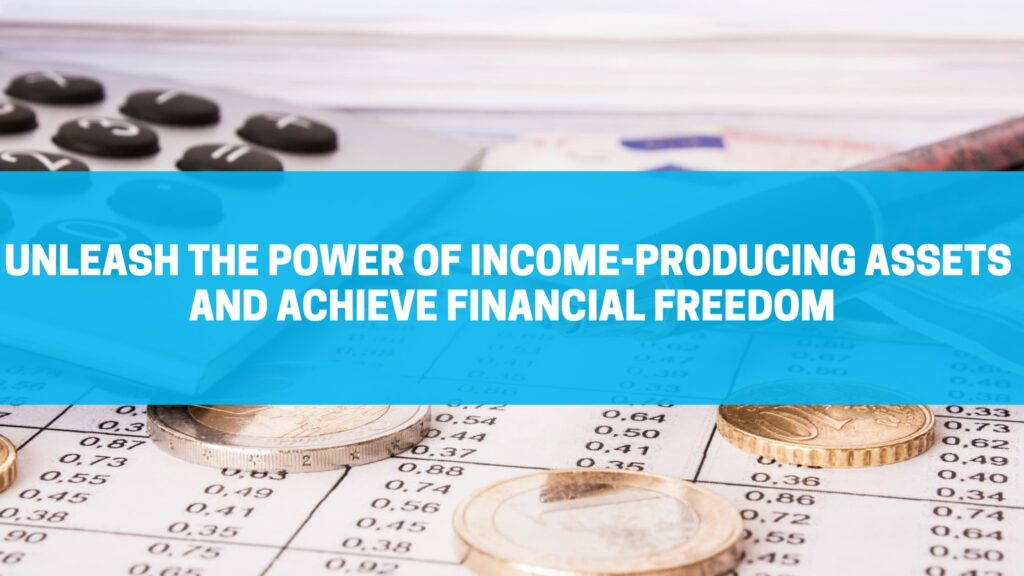From rental properties to dividend-paying stocks, explore the many opportunities for generating passive income and building wealth
Creating a sustainable income stream has become a crucial aspect of financial stability today. Gone are the days when one could expect to make enough from their 9 to 5 job. With increasing inflation, a simple paycheck may not be enough to achieve financial freedom in the long term.
Building income-producing assets is a proven way to create a consistent stream of passive income, which can help you achieve your financial goals faster.
In this article, we will discuss how you can build an income stream and share 15 unique types of income-producing assets that you can consider to generate passive income.
Table of Contents
Importance of Building Income-producing Assets
According to a study conducted by the Federal Reserve, only 36% of Americans would be able to cover a $400 emergency expense without selling something or borrowing money. This data shows that relying on a job as the sole source of income can be risky, especially in times of economic uncertainty.

Here’s a little story to give you more perspective:
Once upon a time, two friends, John and Alex, graduated from the same university and landed jobs at the same company.
John was content with his career and believed his salary would be enough to support his family and save for his future goals. Alex, on the other hand, had a different perspective. He understood the importance of building passive income-producing assets and started investing in different opportunities.
Fast forward ten years, and both John and Alex were successful in their respective fields. However, their lives had taken different paths. John was still working for the same company, and while he had received promotions and salary raises, he was still dependent on his job as his only source of income. Alex, on the other hand, had created several passive income streams from his investments, and his life was dramatically different.
Alex was able to afford a luxurious lifestyle, travel the world, and spend quality time with his family. He had the freedom to pursue his passions and take risks without worrying about losing his primary source of income. John, on the other hand, was still living paycheck to paycheck and was stressed about how he would manage his finances in the event of an emergency.

The reason behind this difference in lifestyle was that Alex had taken the time to build income-producing assets. He had invested in rental properties, stocks, and even started an online business that generated a steady stream of income. Over time, these assets had grown, and his income had increased, making him financially independent.
On the other hand, John missed the opportunity to create additional income streams. He had neglected investing in assets that could provide him with a consistent stream of passive income. As a result, he was still dependent on his job as his sole source of income, limiting his financial freedom and choices.
In conclusion, John and Alex's story highlights the importance of building passive income-producing assets. By creating multiple streams of income, individuals can diversify their income sources, increase their financial stability, and enjoy a more fulfilling lifestyle. While building passive income streams may take time and effort, the rewards are well worth it.
How You Can Benefit From These Assets
Income-producing assets are investments that generate cash flow on a regular basis, providing a steady stream of income. Aside from the obvious monetary benefit and peace of mind, here are some other benefits of income producing assets:
Diversification of income sources
One of the main benefits of income-producing assets is that they offer diversification of income sources. Relying on a single source of income, such as a job, can be risky, especially during times of economic uncertainty. By investing in income-producing assets, you can create additional streams of income that are not tied to your job or any one particular industry.
Increase in net worth and long-term financial stability
Another benefit of income-producing assets is that they can help increase your net worth and provide long-term financial stability. Income-producing assets, such as rental properties and dividend-paying stocks, provide a steady stream of income that can grow over time. This income can be reinvested to generate even more wealth.
Over time, the value of income-producing assets can also appreciate, leading to an increase in net worth. Take the increasing value of property, or crypto coins over the last decade for instance.
Flexibility and independence
Unlike a job, income-producing assets can be managed on your own terms. For example, owning rental properties allows you to set your own rental rates and manage the property yourself or hire a property management company to handle the day-to-day operations. This flexibility allows you to pursue other passions or investments while still generating income.
In addition, income-producing assets can provide financial independence. By generating a steady stream of income, you can potentially retire earlier or work less, allowing you to focus on other aspects of your life.
Tax benefits
Depending on the asset, income generated from income-producing assets may be taxed at a lower rate than income generated from a job. For example, qualified dividends are taxed lower than ordinary income.
In addition, some income-producing assets, such as rental properties, offer tax benefits such as depreciation deductions and deductions for expenses such as repairs and maintenance. These tax benefits can reduce your tax liability and increase your after-tax income.
Click here to know more about the benefits.
Worst Assets You Should Stay Away From
When it comes to investing in income-producing assets, there are many options available. However, not all income-producing assets are created equal. In fact, some income-producing assets can actually be a trap, causing investors to lose money rather than generate income.

High-Yield Bonds
One of the worst kinds of income-producing assets that investors should be cautious of are high-yield bonds. High-yield bonds, also known as junk bonds, are bonds that have a lower credit rating and higher risk of default than investment-grade bonds. In order to compensate for this risk, high-yield bonds offer a higher yield than other bonds.
While the higher yield may be tempting, investing in high-yield bonds can be a trap. If the issuer defaults, investors can lose their entire investment. In addition, high-yield bonds can be more volatile than other types of bonds, making them a risky investment.
Penny Stocks
Another type of income-producing asset that can be a trap are penny stocks. Penny stocks are stocks that trade for less than $5 per share and are often issued by small or start-up companies. These stocks are often touted as a way to get rich quickly, but the reality is that investing in penny stocks can be a trap.
Penny stocks are highly speculative and can be manipulated by unscrupulous promoters. In addition, the companies that issue penny stocks often have a higher risk of bankruptcy or fraud. While some investors may have success with penny stocks, the vast majority of investors will lose money.
Multi Level Marketing Schemes
Multi Level Marketing (MLM) schemes are another type of income-producing asset that can be a trap. MLM schemes are often marketed as a way to generate passive income by selling products or recruiting others to sell products. However, the reality is that MLM schemes often require significant time and effort to generate income.
In addition, MLM schemes can be a trap because they often require new recruits to pay a fee to join or purchase a certain amount of product each month. This can lead to investors spending more money than they earn. Finally, MLM schemes often rely on recruiting new members to generate income, rather than on the sale of products, which can be a sign of a pyramid scheme.
Understanding the Process of Value Creation Overtime
Building an income-producing asset is a powerful way to create long-term financial stability and independence. While the process can be challenging, the potential benefits are huge. Here is a step-by-step process of building an income-producing asset and the key considerations for creating value over time.
Step 1: Identify the Asset Class
The first step in building an income-producing asset is to identify the asset class that best fits your investment goals and risk tolerance. There are many asset classes to choose from, including stocks, bonds, real estate, and businesses. Each asset class has its own unique characteristics, and the right choice will depend on your individual circumstances and objectives.
Step 2: Research and Analyze Potential Investments
Once you have identified the asset class, the next step is to research and analyze potential investments. This process should include a detailed analysis of the asset's historical performance, future potential, risks, and any other factors that may impact its value over time.
Step 3: Develop a Strategy and Plan
After you have identified and analyzed potential investments, the next step is to develop a strategy and plan for building the income-producing asset. This plan should include a clear definition of your investment objectives, the expected return on investment, the timeline for achieving those returns, and any necessary resources or support needed to achieve your goals.
Step 4: Implement and Monitor the Plan
Once you have developed a strategy and plan, the next step is to implement the plan and monitor its progress. This process may involve selecting a specific investment, making the necessary financial commitments, and actively managing the asset over time to ensure that it continues to generate income.
Step 5: Re-evaluate and Adjust the Plan Over Time
Building an income-producing asset is a long-term process, and the investment landscape is always changing. Therefore, it is important to regularly re-evaluate and adjust your plan over time to ensure that it continues to generate value and meets your investment objectives.
Key Considerations for Creating Value Over Time
In addition to the step-by-step process, there are several key considerations for creating value over time when building an income-producing asset:
- Diversification: Diversifying your investment portfolio across multiple asset classes and investments can help reduce risk and increase the potential for long-term returns.
- Active Management: Actively managing your income-producing asset can help ensure that it continues to generate income and increase in value over time.
- Flexibility: Being flexible and adapting your investment strategy as needed can help you navigate changing market conditions and generate long-term returns.
- Patience: Building an income-producing asset is a long-term process, and it requires patience and discipline to achieve the desired results.

21 Unique Asset Ideas
Given below are 15 unique asset ideas that can help you generate a secondary income source:
Dividend Stocks and Stock Funds
Dividend stocks and stock funds can be a great way to generate income from your investments. Dividend stocks are individual stocks that pay regular dividends to their shareholders, while stock funds are collections of stocks that are managed by professional fund managers.
When you invest in a dividend stock, you purchase shares in a company that has a history of paying regular dividends to its shareholders. The amount of the dividend is typically a percentage of the company's earnings, and the dividend is paid out on a regular schedule (usually quarterly).
Stock funds work in a similar way, but instead of investing in individual stocks, you invest in a collection of stocks that are managed by a professional fund manager. The fund manager selects a portfolio of stocks that they believe will generate strong returns, and the income generated from those stocks is then distributed to the fund's shareholders.
Investing in dividend stocks and stock funds can be a great way to generate passive income, but it's important to do your research and invest wisely. Here is a step-by-step guide for beginners:
- Determine your investment goals and risk tolerance.
- Research dividend stocks and stock funds that align with your investment goals and risk tolerance.
- Evaluate the historical performance of the stocks and funds you are considering.
- Consider the fees associated with investing in the stocks and funds you are considering.
- Make your investment by purchasing shares of the stocks or funds you have selected.
- Monitor your investments regularly to ensure they are performing in line with your expectations.
Real Estate Crowdfunding
Real estate crowdfunding is a relatively new concept in which individuals pool their money together to invest in real estate projects. This is typically done through an online platform that allows investors to browse and select investment opportunities. It has gained popularity in recent years as a way for individuals to invest in real estate without the large capital requirements that are typically associated with direct real estate investment.
This practice originated in the United States in 2012 when the Jumpstart Our Business Startups (JOBS) Act was signed into law. This act allowed private companies to solicit investments from the general public without having to register with the Securities and Exchange Commission (SEC). As a result, online platforms were able to emerge and offer real estate investment opportunities to a wider audience.
Real estate crowdfunding can be a lucrative income-producing idea for investors because it allows them to diversify their investment portfolio and generate passive income from real estate projects. By investing in a diversified portfolio of real estate projects, investors can spread their risk and potentially earn higher returns than they would from traditional investments.
The minimum investment required to participate in real estate crowdfunding can vary depending on the platform and the specific investment opportunity. Some platforms may have minimum investments as low as $500, while others may require minimum investments of $10,000 or more.
Investing in Small Businesses
This can be a great way to earn money, as long as you know how to identify the right opportunities. You can invest in small businesses by buying shares, providing a loan, or becoming a silent partner. Each approach has its own advantages and risks, so it's important to carefully consider which option is right for you.
Furthermore, you should also look at the company’s financial statements to evaluate the potential for growth and profitability. Make sure the business is in compliance with all relevant laws and regulations, and that there are no legal or regulatory issues that could pose a risk to your investment.
Finally, consider how the investment fits with your overall financial goals and risk tolerance.
Here are some marketplaces that let you invest in small businesses without a huge capital:
- Wefunder: Wefunder is a platform that allows individuals to invest in startups and small businesses with as little as $100.
- SeedInvest: SeedInvest is a crowdfunding platform that allows investors to invest in early-stage startups.
- Fundable: The platform offers both equity and rewards-based crowdfunding opportunities and is open to both accredited and non-accredited investors.
- AngelList: AngelList is a platform that connects investors with startups seeking funding. The platform offers a range of investment opportunities, including syndicates, venture funds, and individual investments.
- MicroVentures: The platform focuses on companies that have already raised some funding and have a proven track record of growth.
Royalties
Royalties are payments made to an individual or business in exchange for the right to use a particular asset, such as a patent, trademark, or copyrighted work. By licensing your intellectual property, you can earn royalties from others who wish to use your work.
Creating royalty income typically involves the following steps:
- Identify your intellectual property: Consider what assets you own that have value, such as patents, trademarks, or copyrighted works.
- Protect your intellectual property: Once you have identified your intellectual property, it is important to protect it by obtaining patents, trademarks, or copyrights as necessary.
- Find a licensing partner: To earn royalties, you will need to find a licensing partner who is willing to pay you for the right to use your intellectual property
- Negotiate a royalty agreement: Once you have found a licensing partner, you will need to negotiate a royalty agreement that outlines the terms of your compensation.
- Monitor your royalties: After establishing a royalty agreement, it is important to monitor your earnings and ensure that you are being compensated fairly.
Money Market Accounts
A money market account (MMA) is a type of savings account that typically offers a higher interest rate than a traditional savings account. MMAs are typically offered by banks and credit unions and are FDIC-insured up to $250,000 per depositor.
The interest rate on a money market account varies depending on the financial institution and the current market conditions. As of February 2023, the average interest rate on a money market account is around 0.15% to 0.20%, although some institutions offer rates as high as 1.00% or more.
Look for institutions that have a good reputation and offer competitive interest rates. You can also compare fees and minimum balance requirements to find an account that fits your needs.
When considering a money market account, it's important to keep in mind that they may have restrictions on the number of transactions you can make each month, typically up to six withdrawals or transfers per statement cycle. Additionally, some institutions may charge fees if your balance falls below a certain threshold.
Farmland
Ever dreamed of making money while lounging in a hammock, sipping on lemonade and basking in the sun? Well, forget about getting a high-paying job or winning the lottery, because this solution is even better – making money from farmlands passively! Yes, you heard it right, you can earn money without even getting your hands dirty (well, maybe just a little bit).
Here are some good ways:
- Rent the Farmland: One way to make money passively from farmland is to rent it out to farmers or ranchers. This way, you can earn regular rental income without having to actively work on the land.
- Lease the Land for Hunting or Fishing: If your farmland has good hunting or fishing opportunities, you can lease it out to hunters or fishermen for a fee. This can be a great way to earn passive income, especially if your farmland is located in a popular hunting or fishing area.
- Install Wind Turbines or Solar Panels: Another way to make money from farmland passively is to lease out the land for the installation of wind turbines or solar panels. This can provide a source of passive income from the energy generated by these systems.
- Sell Timber or Mineral Rights: If your farmland has timber or mineral rights, you can sell them to companies or individuals who are interested in harvesting the resources. This can provide a source of passive income without having to actively manage the land.
- Partner with a Farmer: If you don't want to actively manage the farmland, you can partner with a farmer who will manage the land and share the profits with you. This way, you can earn passive income from the farmland without having to put in the work of managing it.
eBook and digital products
Making money from digital products and e-books can be a great way to earn passive income but it does require effort and a well-executed strategy. Digital products can include e-books, courses, music, graphics, software, and more.
The key to making money from digital products is to create something that gives value to your target audience. This means understanding your audience's needs and interests, and creating a product that addresses those needs. Once you have created your product, you will need to promote it effectively to reach potential customers.
Once you have created an audience, it is now time to market your product. For this, you can turn to your audience if you have one, or make use of online platforms to promote your offer.
There are several platforms you can use to sell your digital products and e-books:
- Amazon Kindle Direct Publishing: This platform allows you to self-publish your e-book on Amazon and reach millions of potential customers. You can set your own prices and earn up to 70% royalties on your sales.
- Gumroad: This platform allows you to sell a variety of digital products, including e-books, courses, and music. You can set your own prices and keep up to 95% of your sales revenue.
- Selz: This platform allows you to create and sell digital products, including e-books, courses, and software. You can set your own prices and keep up to 95% of your sales revenue.
- Shopify: This platform is primarily known for e-commerce, but it also has a digital downloads feature that allows you to sell your digital products and e-books. You can set your own prices and keep up to 100% of your sales revenue.
- Etsy: While Etsy is primarily known for handmade and vintage items, it also has a digital downloads category that allows you to sell your digital products and e-books. You can set your own prices and keep up to 97% of your sales revenue.
Land Rentals
Whether you have a piece of land just sitting out, or you are looking to potentially acquire/inherit a space, you can make definite income by land rentals. That said, this is not as simple as just renting out your land and earning money.
Managing a property also requires proper upkeep, and knowledge of appropriate market rates, and compliance with local zoning laws. Some key things that you should know about before getting started are:
- Zoning and Permits: Before renting out your land, you will need to check the zoning laws and regulations in your area. You may also need to obtain permits from local authorities.
- Property Maintenance: Keeping your property well-maintained is crucial to attracting renters and earning a steady income. This may include regular landscaping, repairs, and upkeep.
- Market Demand: It's important to research the demand for land rentals in your area. Consider factors such as population growth, local industries, and other factors that may influence demand.
- Pricing Strategy: Setting the right price for your land rental can be tricky. You'll need to consider factors such as market demand, property location, and local competition to determine a fair price.
- Liability and Insurance: Renting out your land comes with potential liabilities, so it's important to have the proper insurance coverage in place to protect yourself and your property.
Once you have considered these factors and are ready to move forward with renting out your land, here are some steps to take:
- Determine the Type of Rental: There are many different types of land rentals, such as pasture land for livestock, recreational land for camping or hunting, or commercial land for businesses. Decide on the type of rental that best suits your property and target audience.
- Advertise Your Rental: Once you have your rental ready, advertise it to your target audience. This may include placing ads in local newspapers or online marketplaces.
- Screen Potential Renters: It's important to screen potential renters carefully to ensure they are a good fit for your property and that you are protected from potential liabilities.
- Create a Rental Agreement: A rental agreement should be created that outlines the terms and conditions of the rental, including payment schedules, length of the rental, and any restrictions or requirements.
- Manage the Property: Once you have renters in place, it's important to manage the property effectively. This may include regular property inspections, addressing maintenance concerns promptly, and collecting rent payments on time.
Car Rentals
Is your car just sitting in your garage or parking spot all day, only to be used for a mundane grocery run or a monotonous commute to work? Why not put that metal box to work and make some cash?
Depending on the model you have, research the average rental rates for similar cars and determine what you can reasonably charge. Look at the demand for car rentals in your area and see if there are any events or peak seasons that could increase demand.
Then, get adequate insurance coverage that includes commercial use of your vehicle. Some rental platforms that allow you to rent out your car are:
- Turo
- Getaround
- Zipcar
- Enterprise CarShare
- Hertz
- Avis
To maximize your profits, make sure you keep your car in good condition. Regular maintenance and cleaning can prevent any issues that could result in costly repairs or negative reviews from renters. Take pictures of your car before and after each rental to document any damages and protect yourself from any potential disputes.
Private Equity Investing
Private equity investing involves investing in companies that are not publicly traded. These companies are typically not available for investment through traditional channels, such as the stock market. Instead, investors often invest directly in the company or through a private equity fund managed by a private equity firm.
While private equity investing can be a lucrative investment strategy, it is often considered to be a higher-risk investment compared to more traditional investments. As a result, it is generally recommended that beginner investors focus on building a strong foundation in traditional investments before exploring private equity investing.
That being said, there are resources available for those interested in learning more about private equity investing. Here are some good educational sources to consider:
- The Private Equity Primer: This book provides an overview of private equity investing and covers key concepts and strategies.
- The National Venture Capital Association: The NVCA is a trade organization that provides resources and information on private equity and venture capital investing.
- The Private Equity Council: This organization represents the private equity industry and provides information on private equity investing.
RV or Camper
You can rent out your RV or camper on peer-to-peer rental platforms like Outdoorsy, RVshare, and CamperTravel. These platforms connect RV owners with renters who are looking for a unique travel experience. You can set your rental price, availability, and rental policies. On average, RV owners can earn up to $30,000 per year by renting out their RVs.
Next option is to offer storage space. If you have extra space in your RV or camper, you can offer it as storage space to people who need a safe and secure place to store their belongings. You can advertise your storage services on online marketplaces like Craigslist and Facebook Marketplace.
REITs
This option lets you invest in the real estate market without having to lump in a massive amount of money in the beginning. REITs, or Real Estate Investment Trusts, are companies that own, operate, and manage real estate properties such as apartment complexes, office buildings, shopping centers, hotels, and warehouses.
These companies allow individual investors to pool their money together to invest in these properties, providing a way for investors to earn passive income from real estate without actually having to purchase and manage properties themselves.
To create passive income with REITs, investors can purchase shares of publicly traded REITs on major stock exchanges, just like they would purchase stocks of any other company. The income generated by these properties is then distributed to investors in the form of dividends. Depending on the REIT, the dividend yield can range from 2-8%, making it a potentially lucrative income source for investors.
You can also consider joining organizations such as the National Association of Royalty Owners or attending industry events to stay up-to-date on the latest trends and best practices in the field.
Mineral Rights
Mineral rights are a type of property rights that allow individuals or companies to extract minerals, such as oil, gas, and coal, from a particular tract of land. Mineral rights owners are entitled to a percentage of the revenues generated from the extraction of these minerals, making it a potential source of passive income.
The amount of money that can be earned from mineral rights varies greatly depending on a number of factors, such as the type and amount of minerals present, the demand for these minerals, and the terms of the mineral lease or royalty agreement.
One of the main benefits of owning mineral rights is the potential for long-term passive income. Once a mineral lease or royalty agreement is in place, mineral owners can sit back and collect regular payments from the extraction of minerals on their land without having to actively participate in the process.
However, there are some risks and challenges associated with mineral rights ownership. For example, the price of minerals can fluctuate greatly over time, and there is always a risk that the extraction process could damage the land or water resources. Additionally, navigating the legal and regulatory landscape surrounding mineral rights can be complex and challenging.
Online Business
This might sound pretty vague, given that most people do not even have an idea of what their business should be about. In such a scenario, the most crucial thing is that you go for a service that solves an existing pain-point in society. This could be a unique service, or a pre-existing one but at lower rates/shorter turnaround times.
Having an online business will also most likely require you to put in a significant number of hours per day, but the key is to build your business so that it can be automated later.
Furthermore, all the tasks which will initially require your time, can be outsourced to a VA later once you start bringing in revenue. Analyze your potential competitors to determine how they are marketing their products, what they are offering, and what their target audience is. This information can help you identify gaps in the market that you can fill with your own products or services.
Annuities
An annuity is essentially an agreement between you and an insurance company. You pay the insurance company a lump sum of money, and in exchange, the insurance company agrees to provide you with a steady stream of income over a period of time.
You have multiple options ranging from fixed annuities, variable annuities, and indexed annuities. Each type of annuity has its own benefits and risks, so it's important to choose the one that suits your needs.
This is the option to go for if you’re looking for a reliable source of passive income post retirement. The primary benefits of annuities include:
- Guaranteed Income: Annuities provide a guaranteed stream of income during retirement, which can help retirees manage their expenses and live comfortably.
- Tax-Deferred Growth: Annuities grow tax-deferred, which means you do not have to pay taxes on the growth until you start receiving payments.
- Flexible Options: Annuities offer a range of investment options, including fixed, variable, and indexed annuities. This provides investors with the flexibility to choose an annuity that meets their specific needs and risk tolerance.
Conclusion
In conclusion, income producing assets are an excellent way to build wealth and secure your financial future. By diversifying your income sources, you can reduce risk and increase stability.
From real estate and dividend stocks to online businesses and farmland rentals, there are many options available to suit your interests and goals. It is important to do your research and carefully consider the risks and benefits before investing in any asset.
FAQ
Given below are some FAQs to further clear your doubts about income producing assets:
What are the Most Profitable Assets?
Cryptocurrencies: Bitcoin, the world's largest cryptocurrency, had a return of over 8,900% in the past 10 years (as of September 2021), followed by Ethereum with a return of over 44,000%.
Technology stocks: The technology sector has seen significant growth in the past decade, with companies such as Amazon, Apple, and Microsoft providing returns of over 1000%.
Real estate: Real estate has also been a profitable asset class in the past 10 years, with an average annual return of 8.6% for commercial real estate and 9.6% for residential real estate.
How do I Calculate Return on Investment (ROI)?
To calculate ROI, you divide the profit or gain from an investment by the cost of the investment, and then multiply that number by 100. For example, if you invested $1,000 and earned a profit of $200, your ROI would be 20% ($200 profit / $1,000 investment x 100).
How Can I Manage My Debt Effectively?
Managing debt effectively involves developing a budget, prioritizing debts by interest rate, and creating a plan to pay them off systematically. It's important to avoid taking on new debts and to explore options for reducing interest rates, such as balance transfers or negotiating with creditors.
Consolidating debts can also be a useful strategy, as it allows for a single monthly payment and potentially lower interest rates. Seeking professional financial advice can also be helpful for those struggling with debt or who need guidance on developing a personalized debt management plan.





